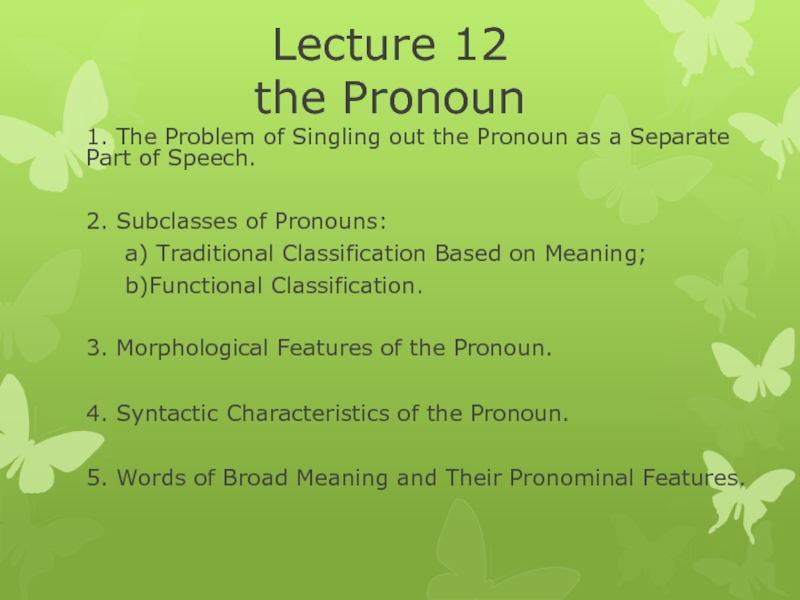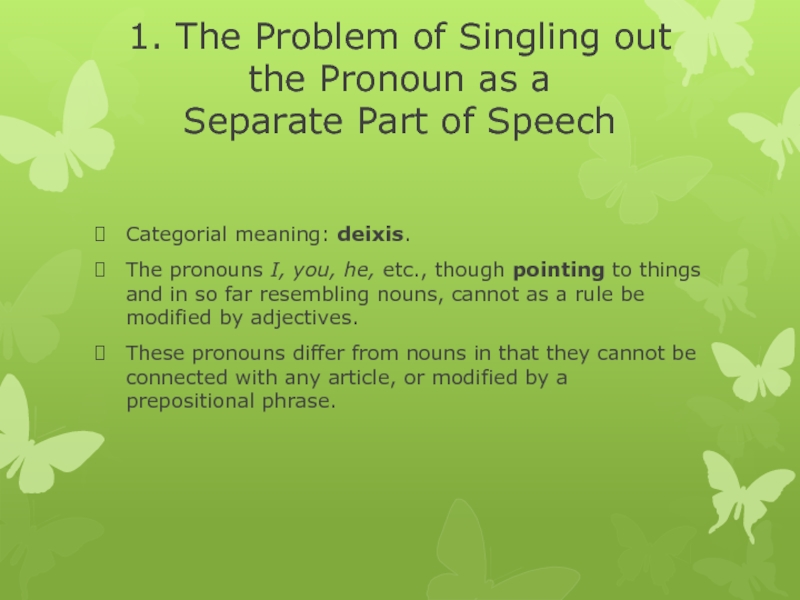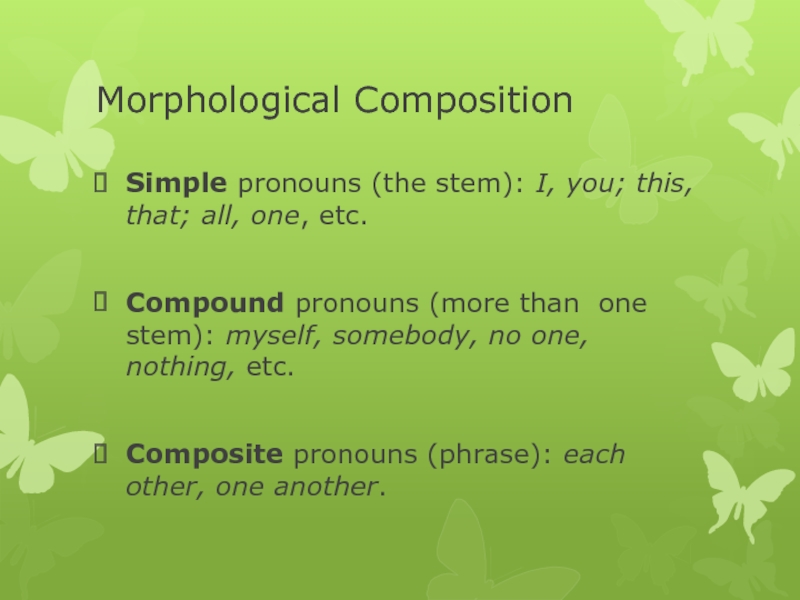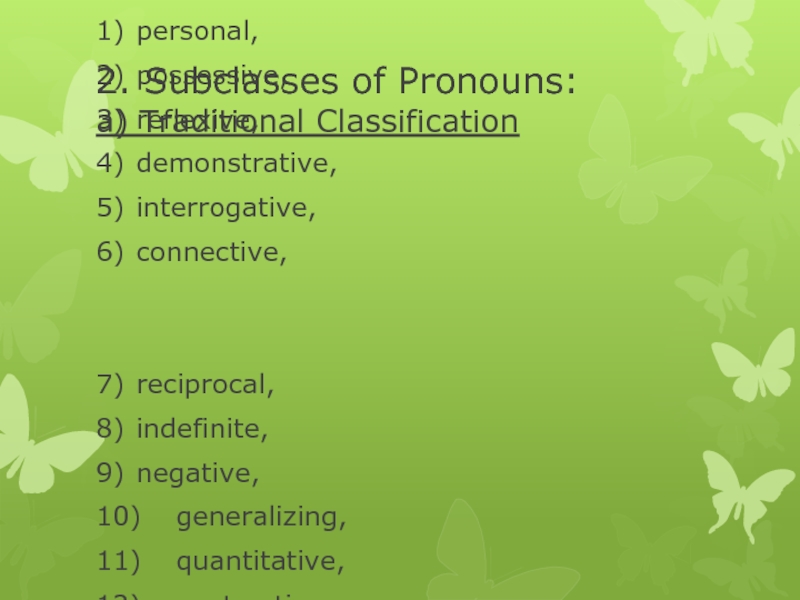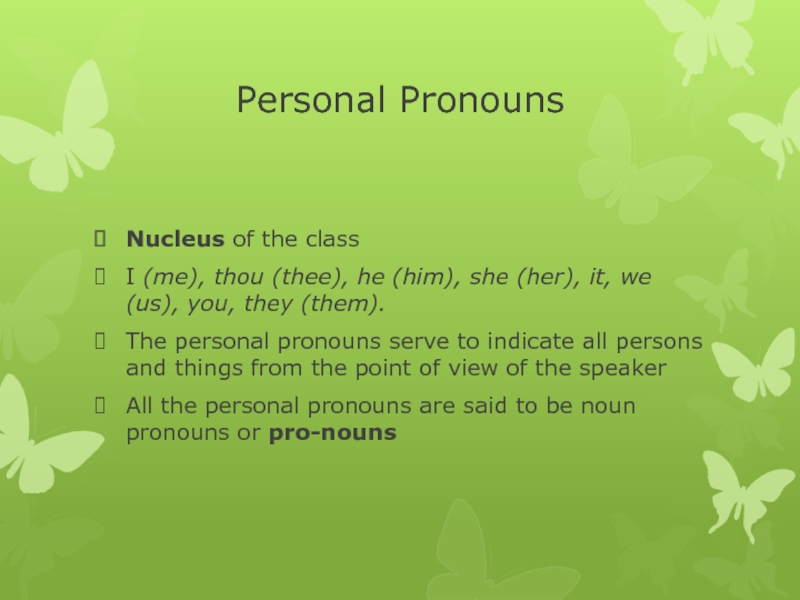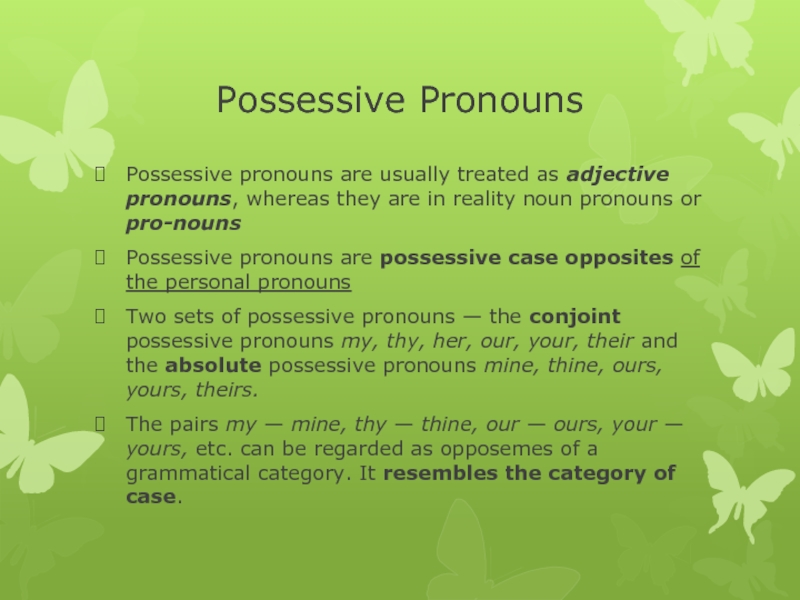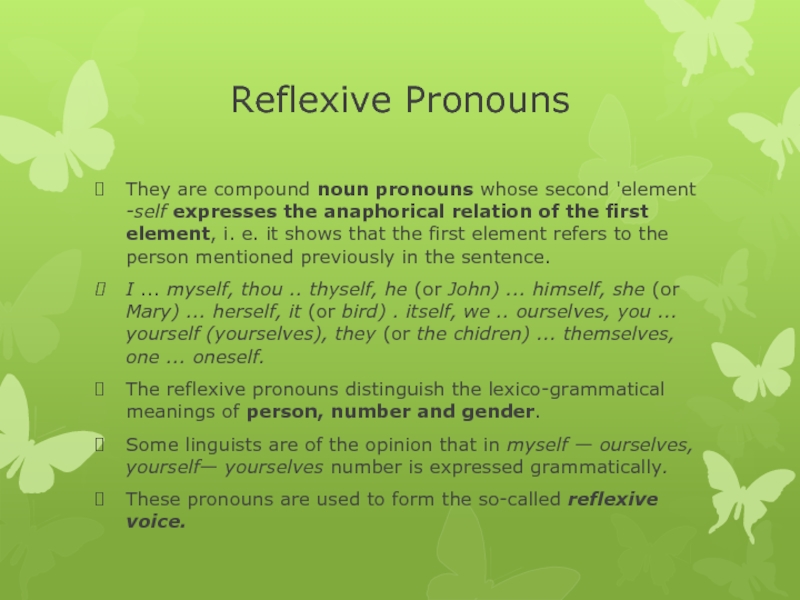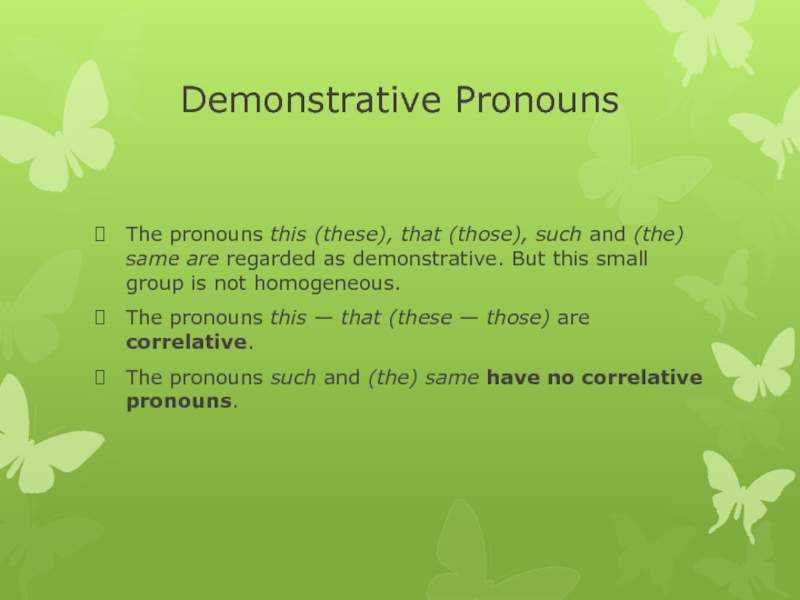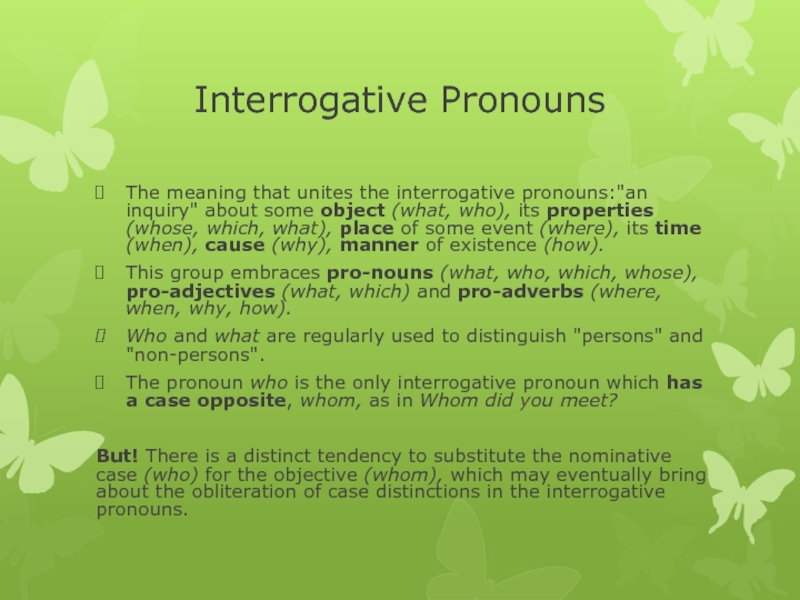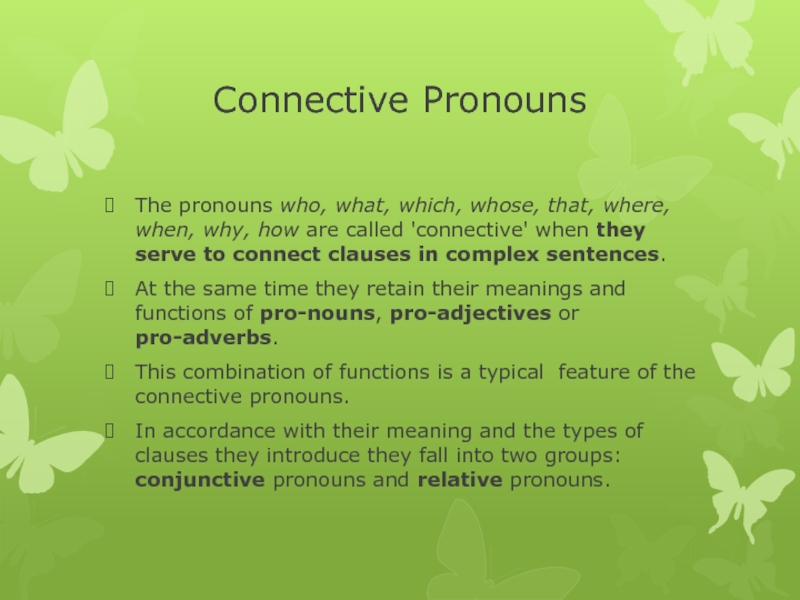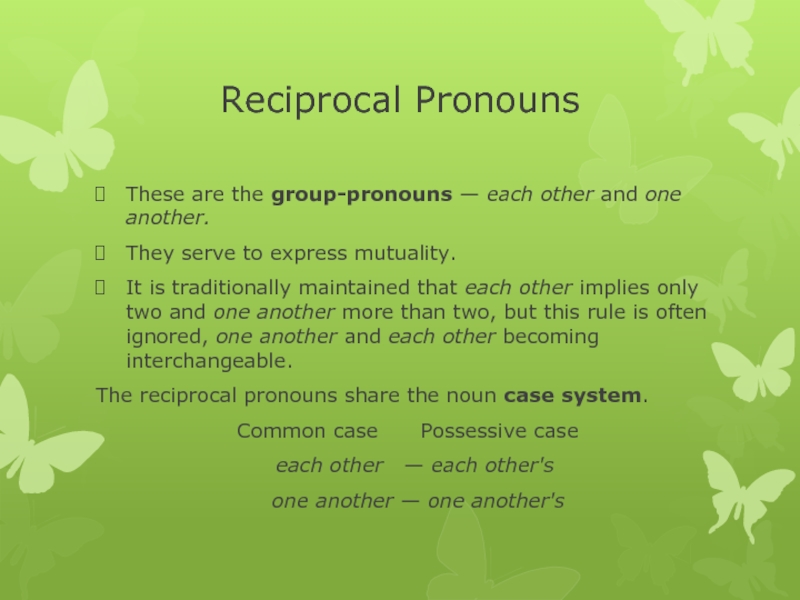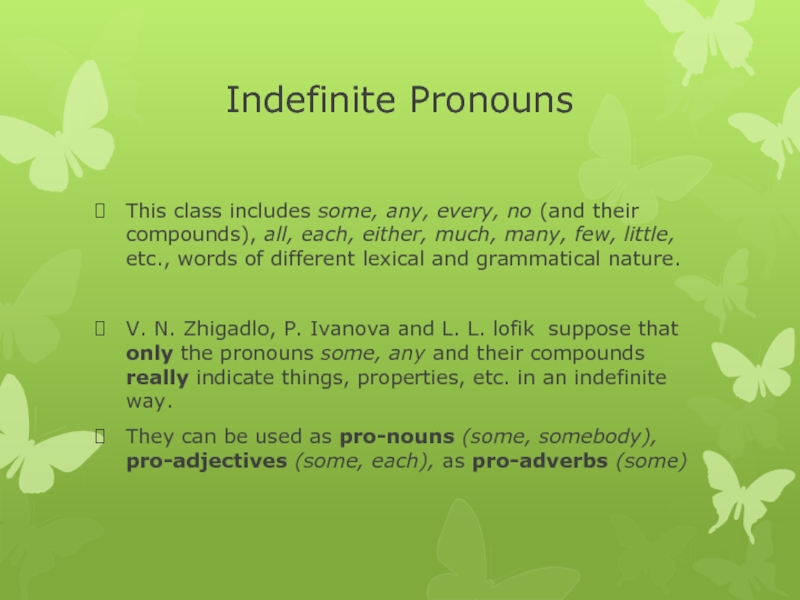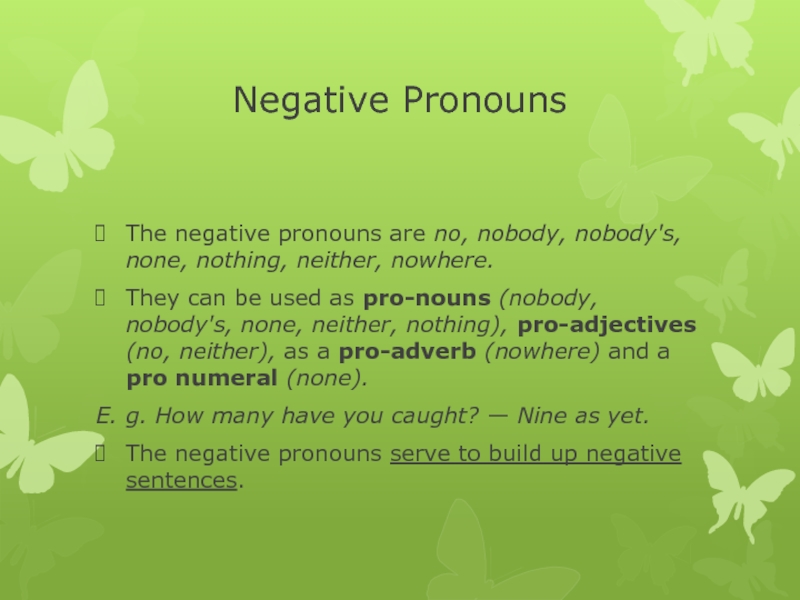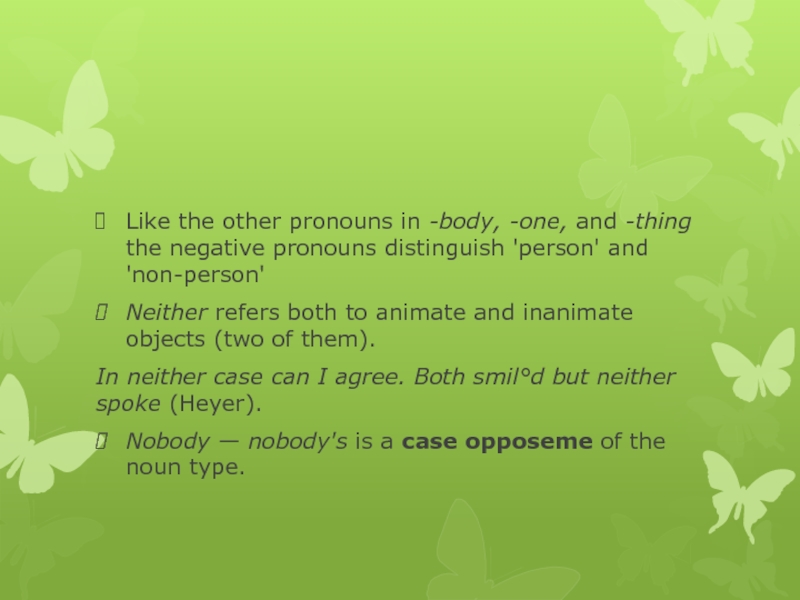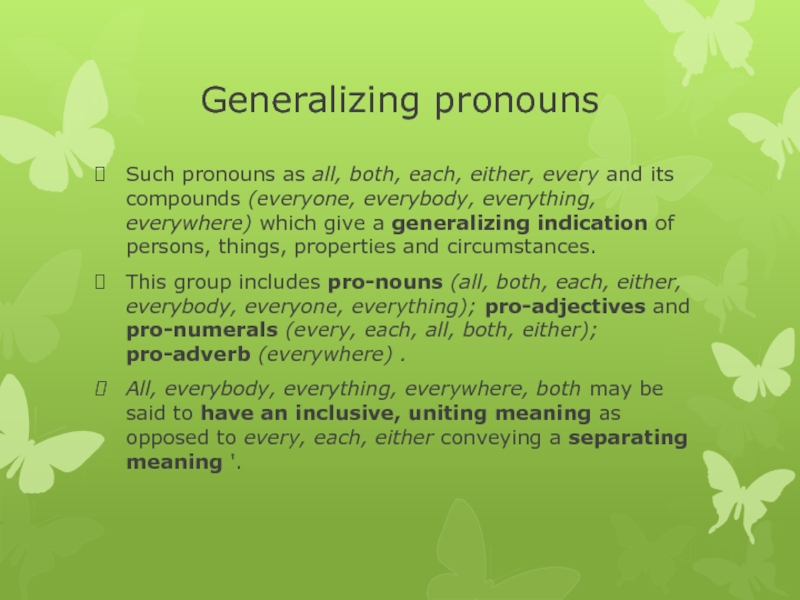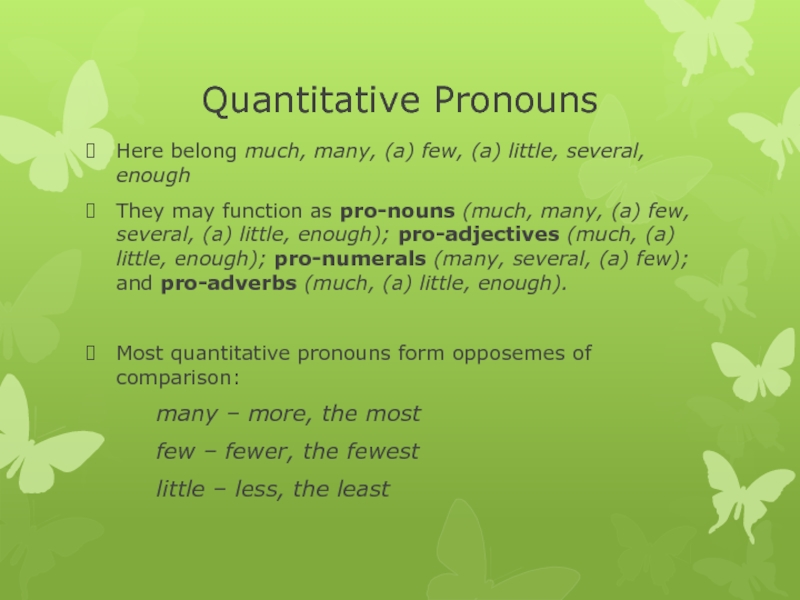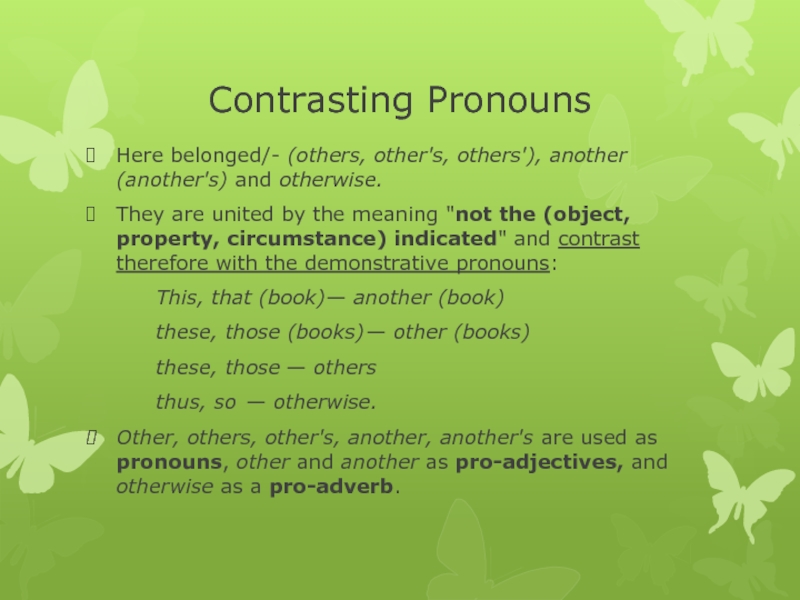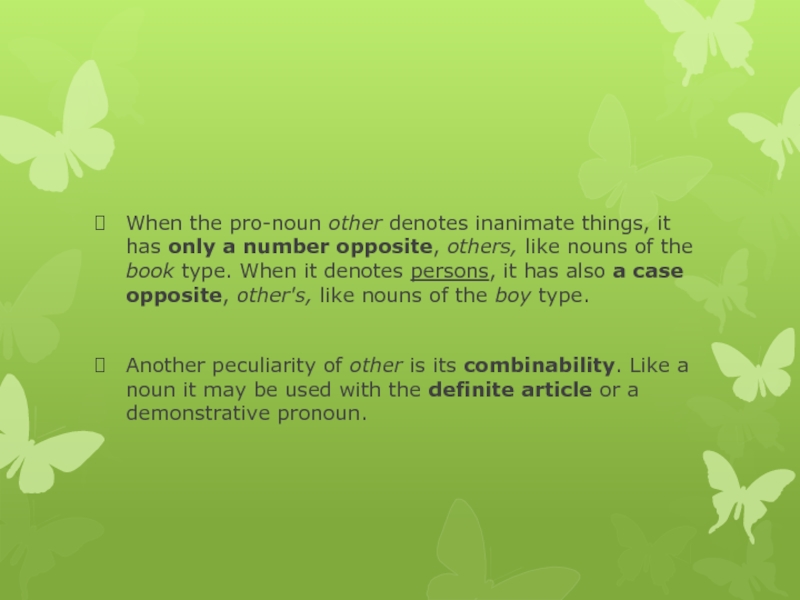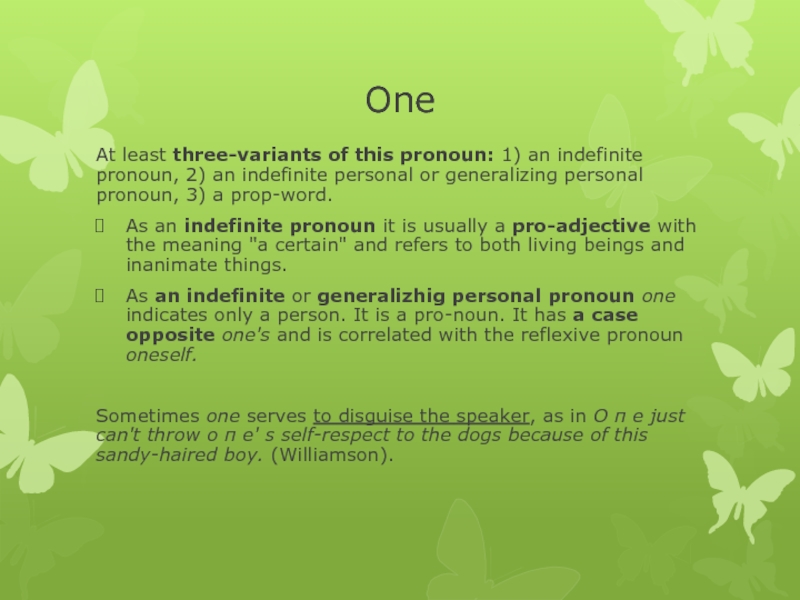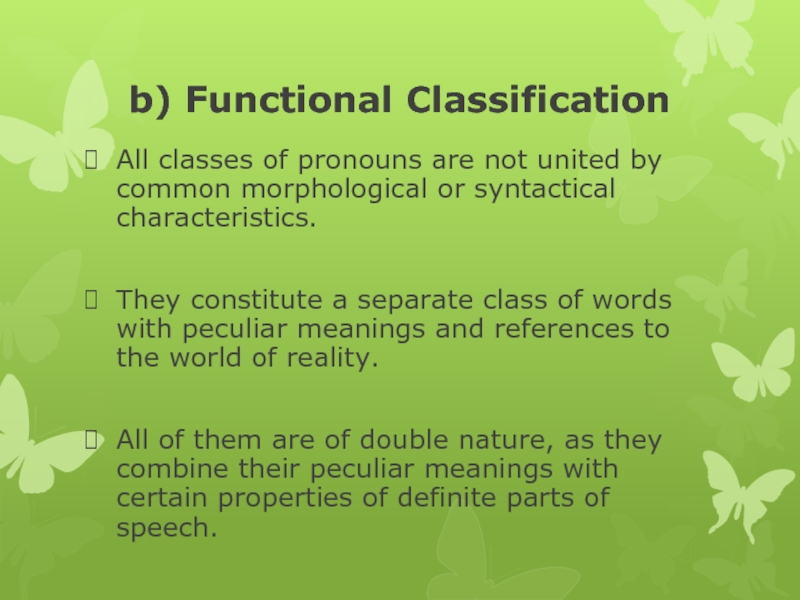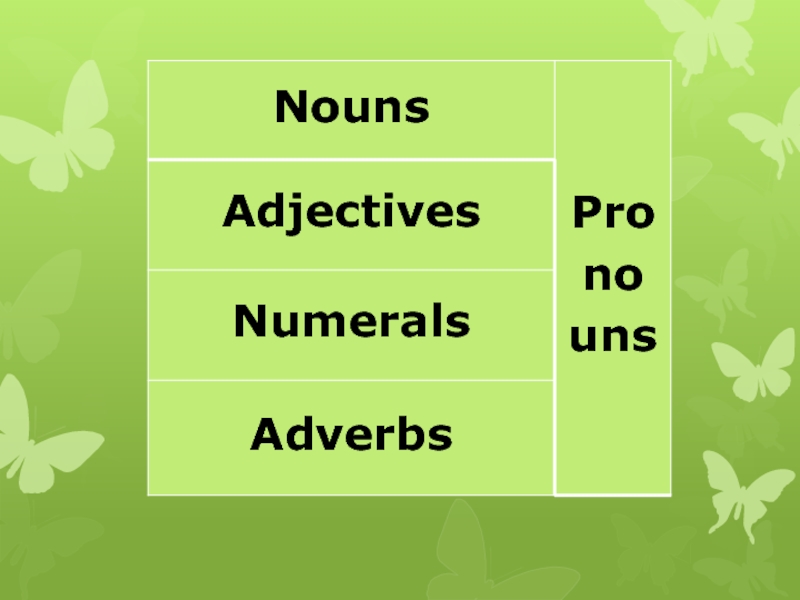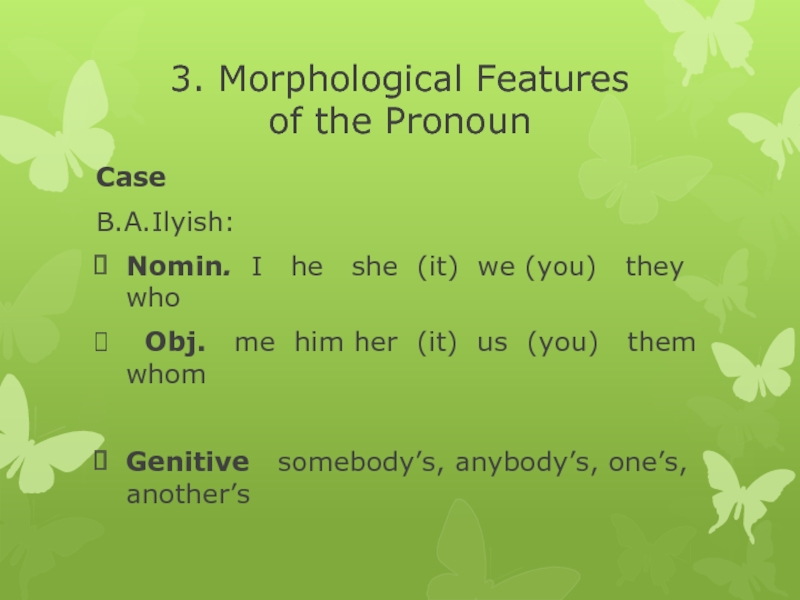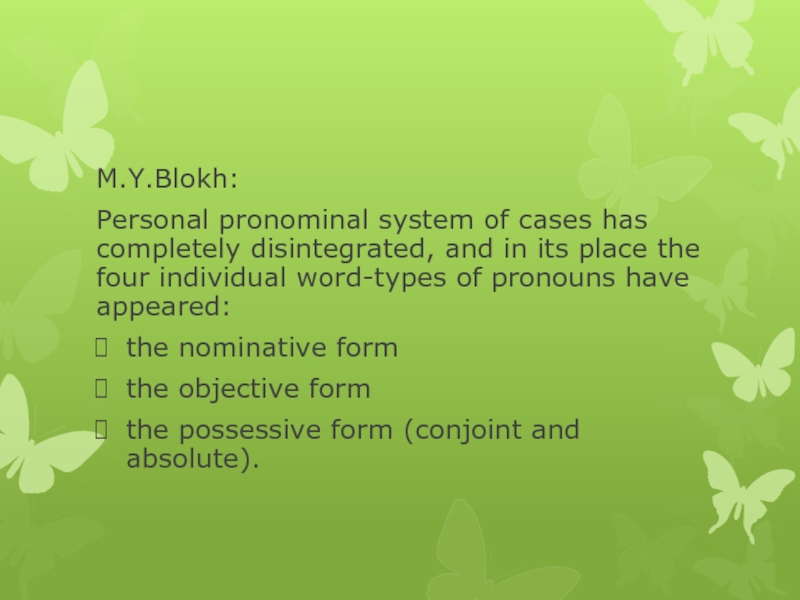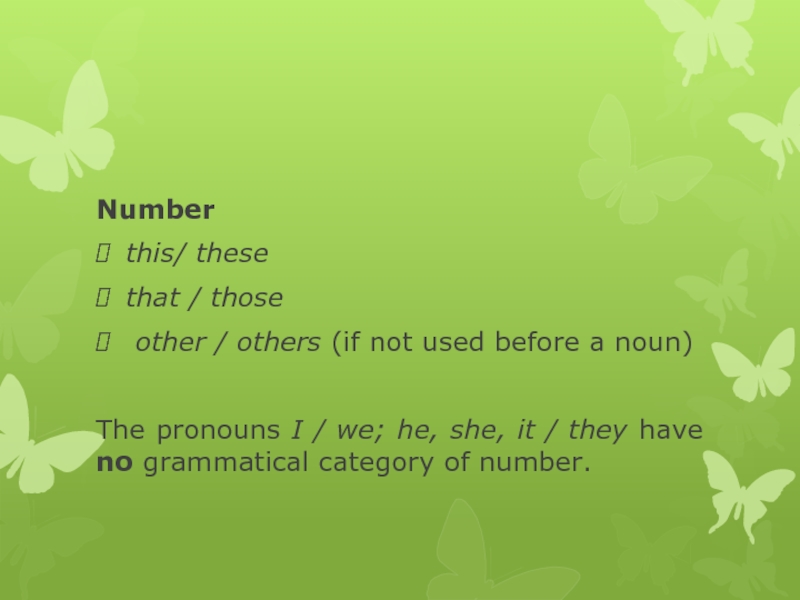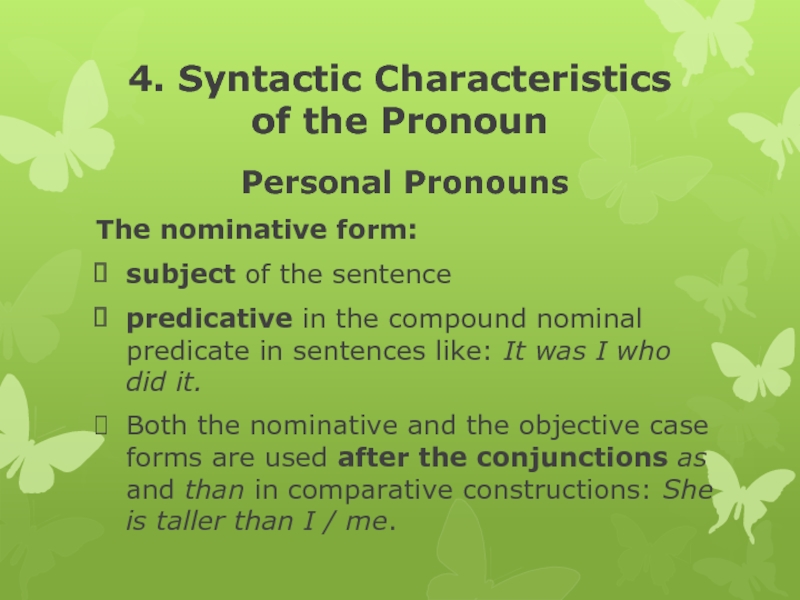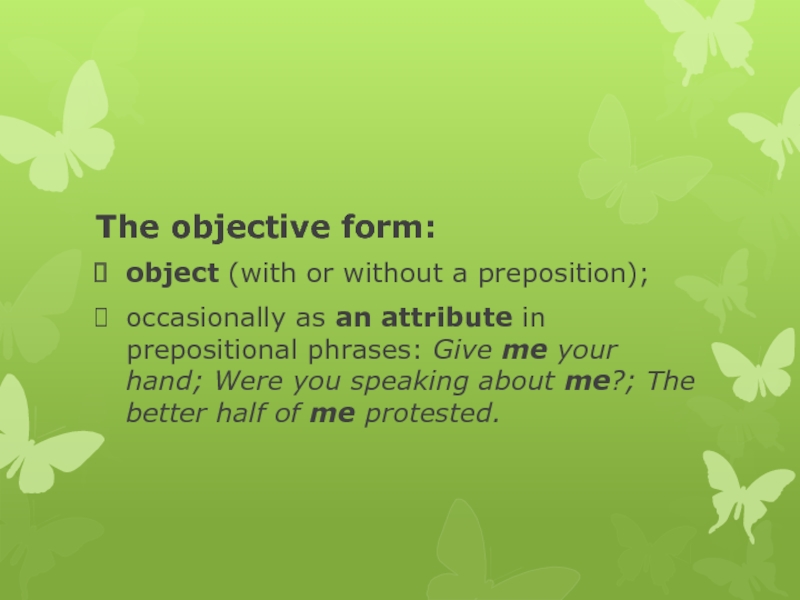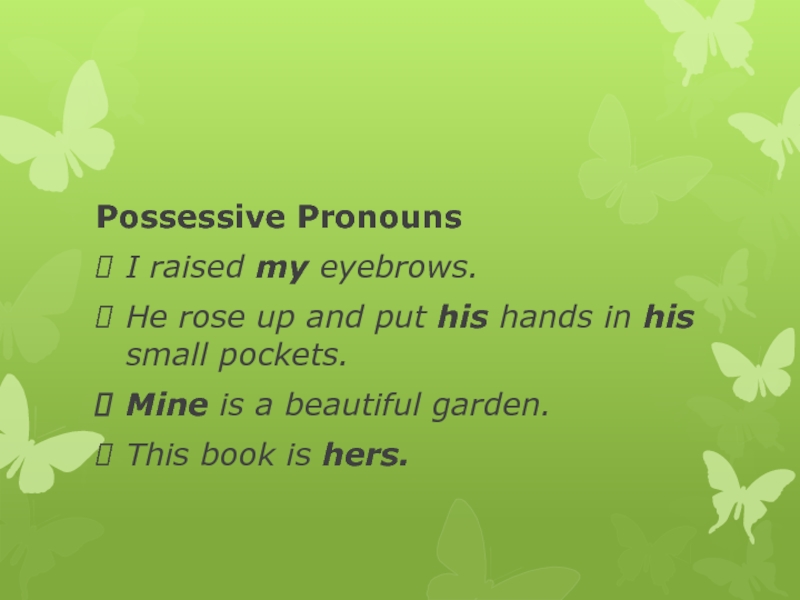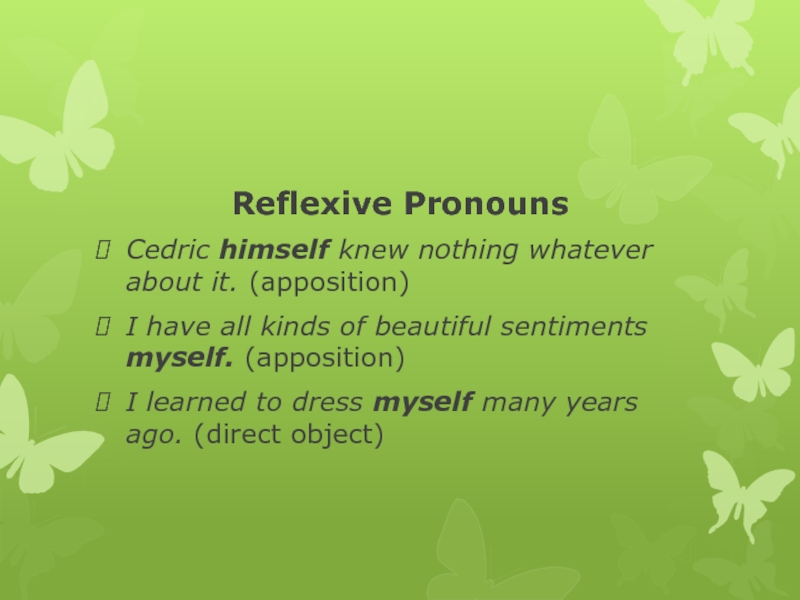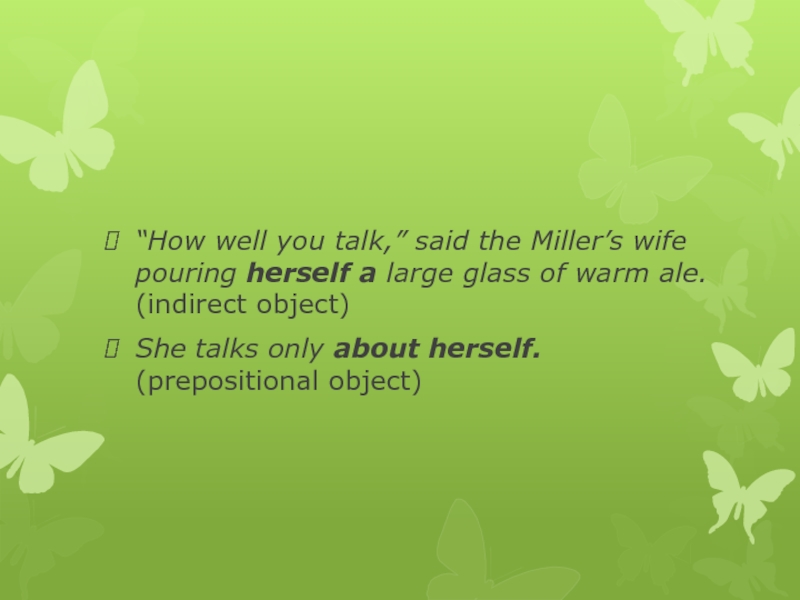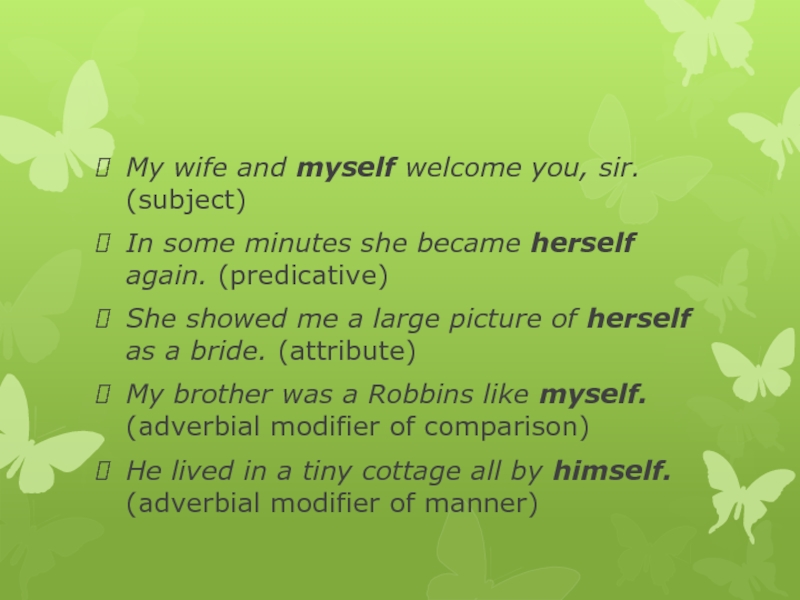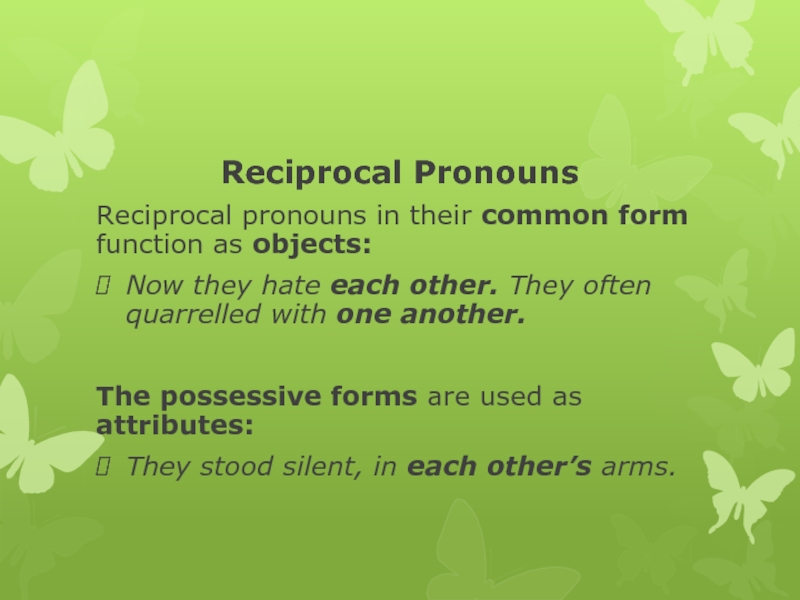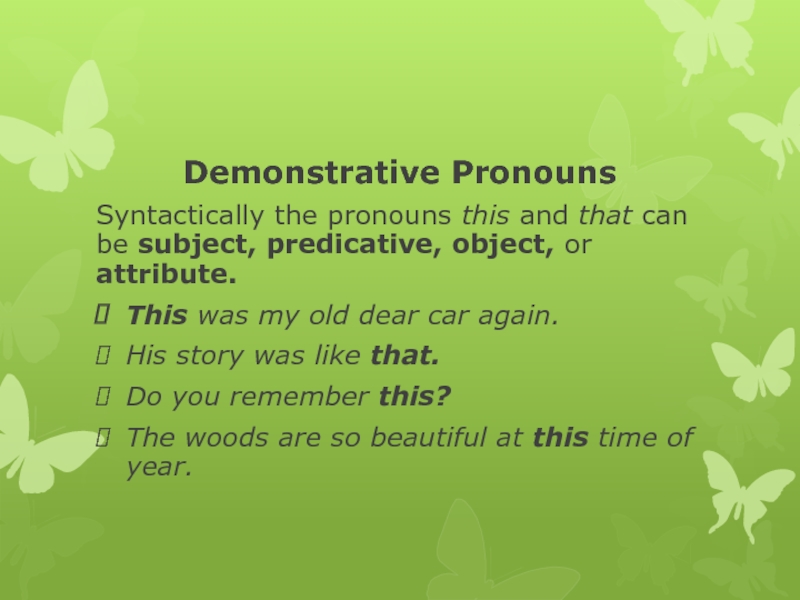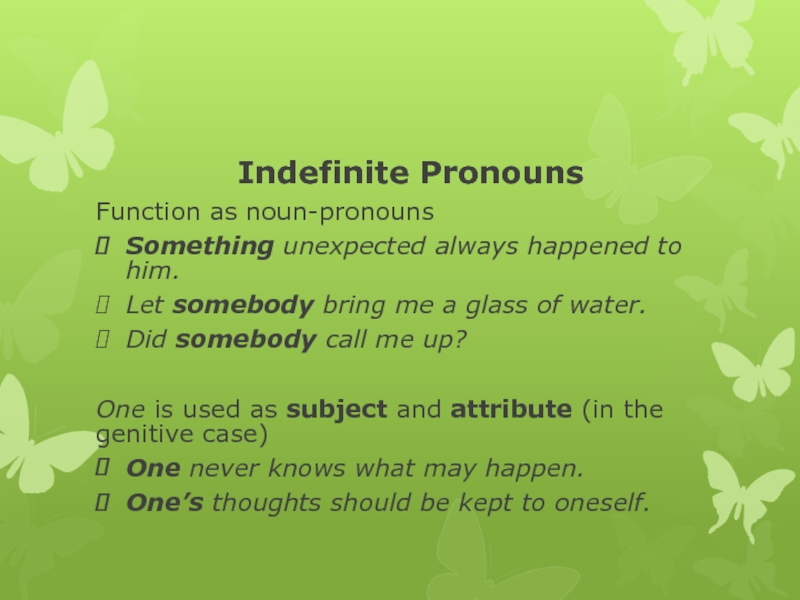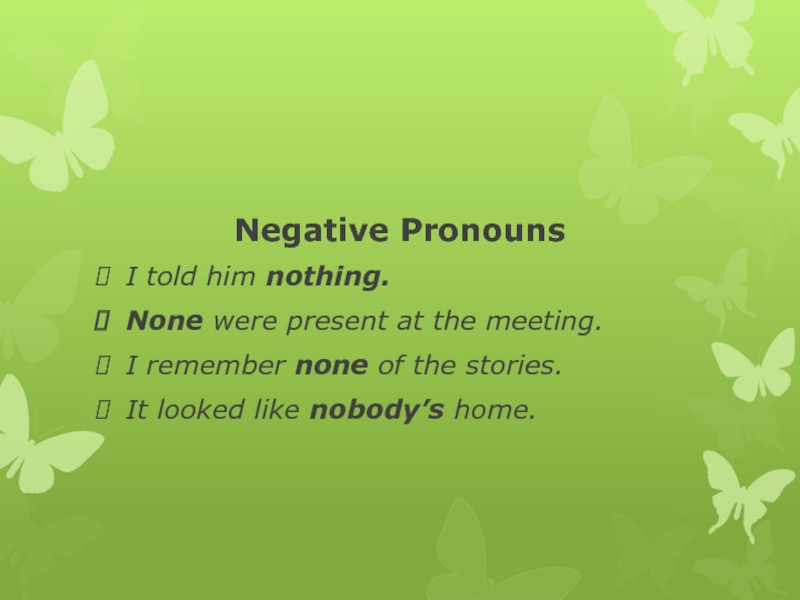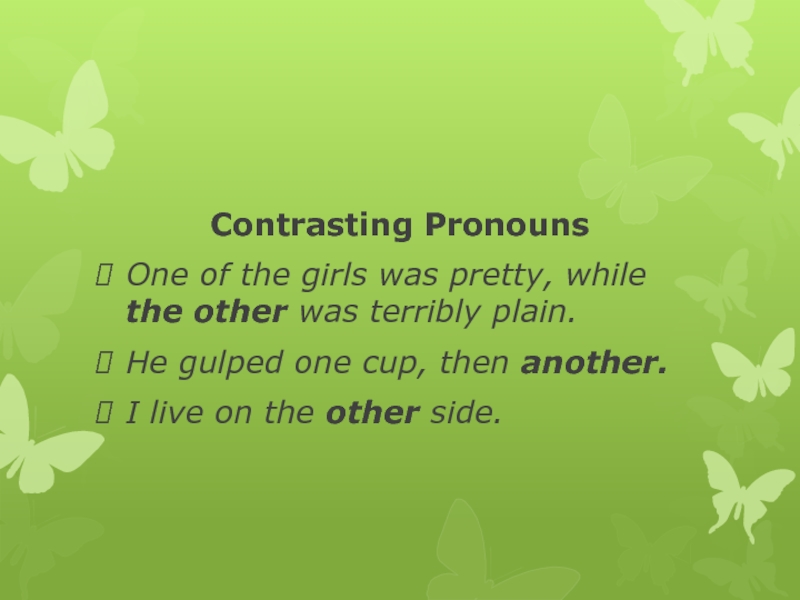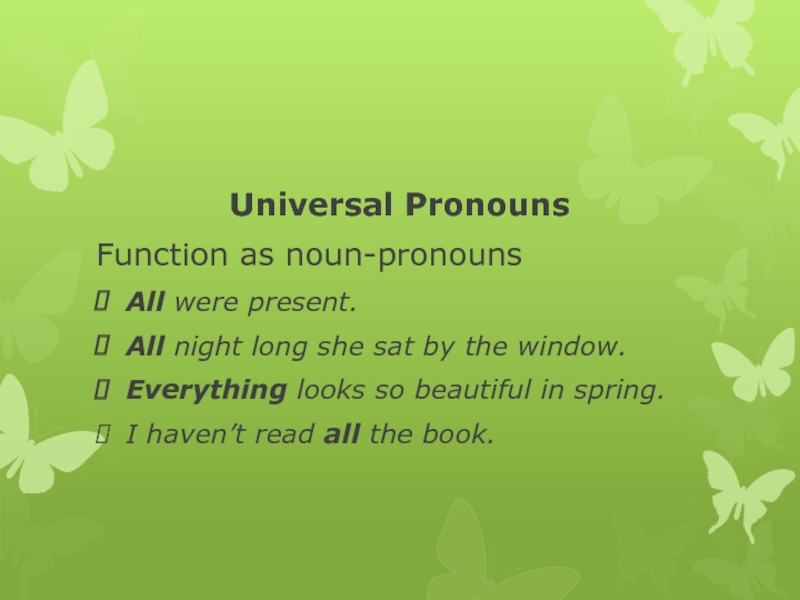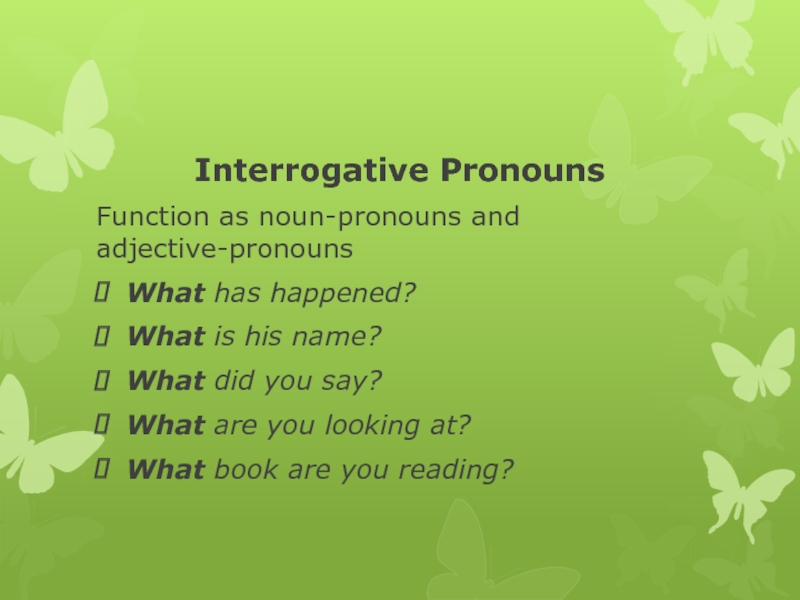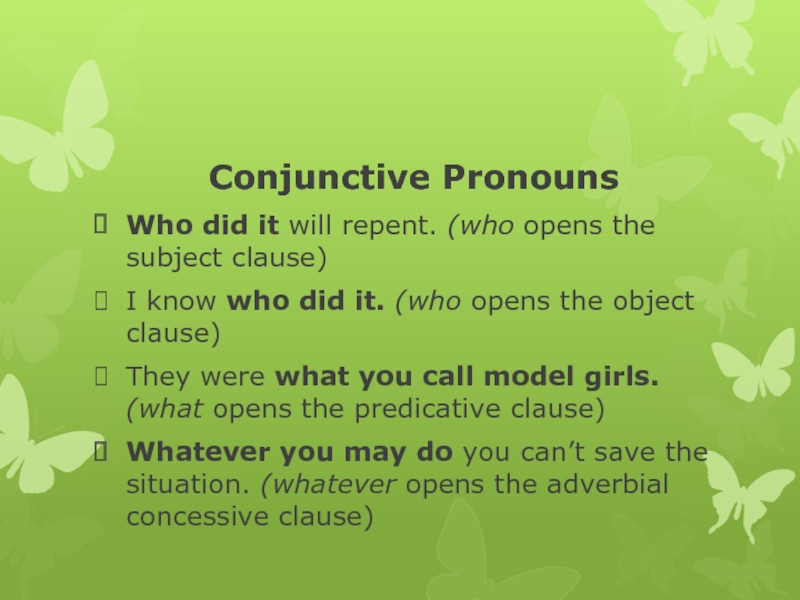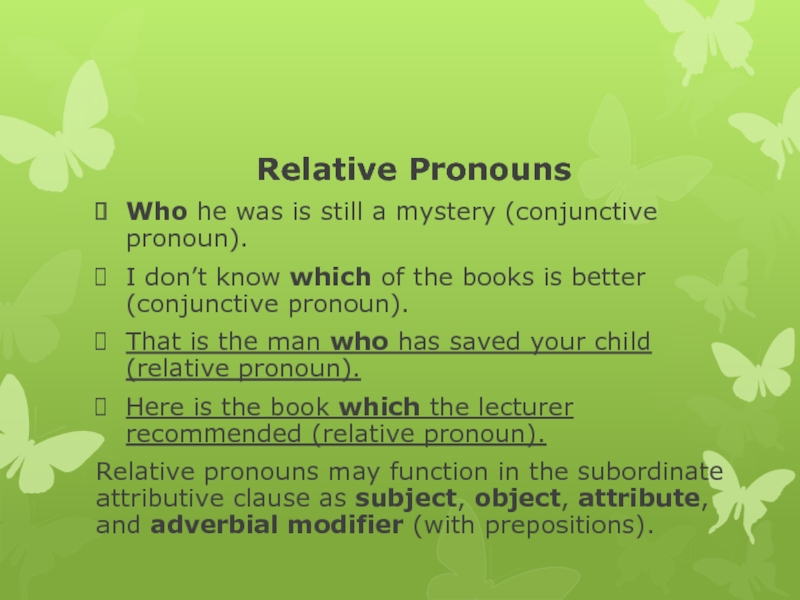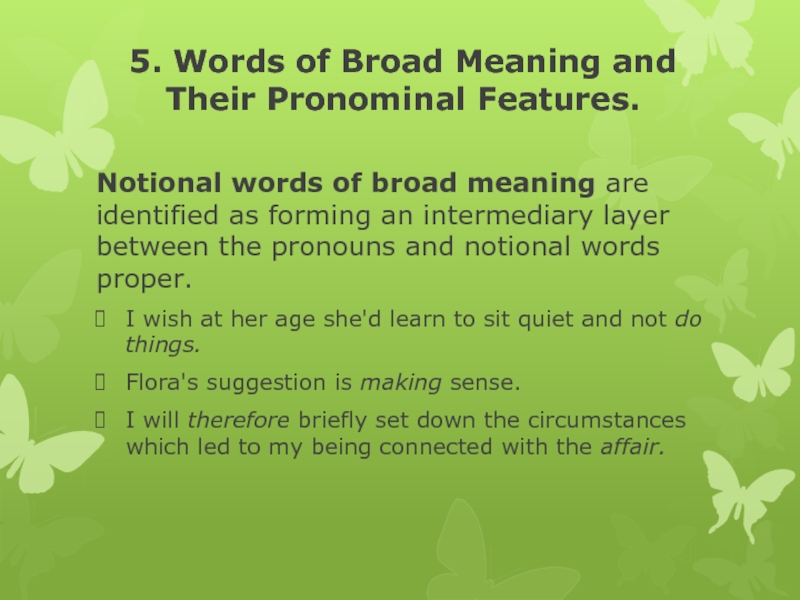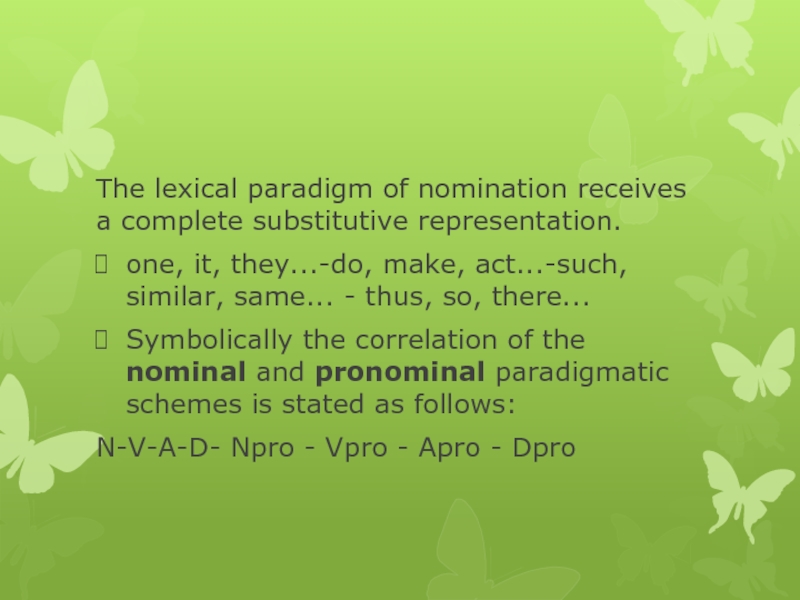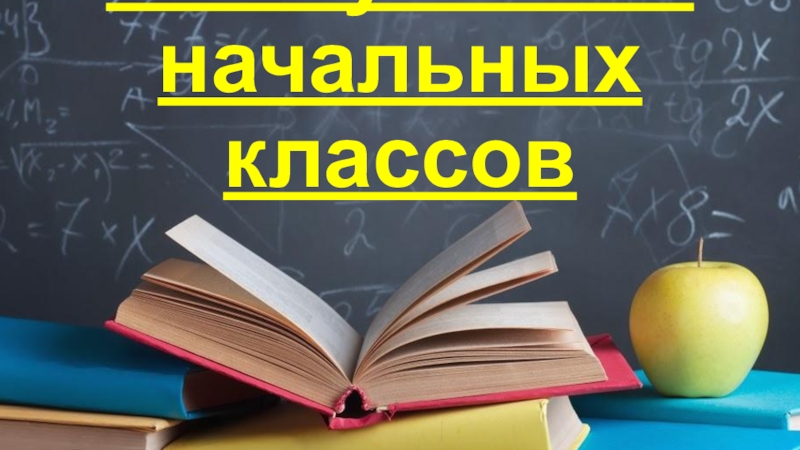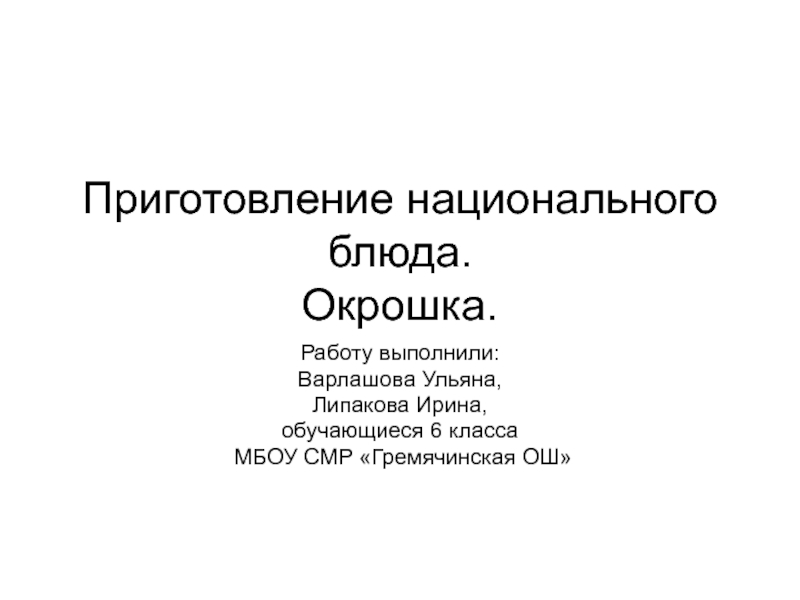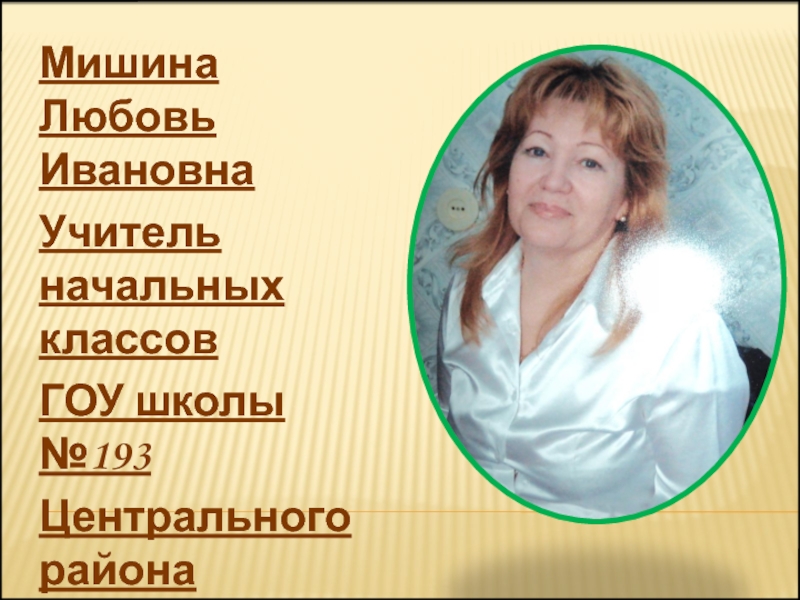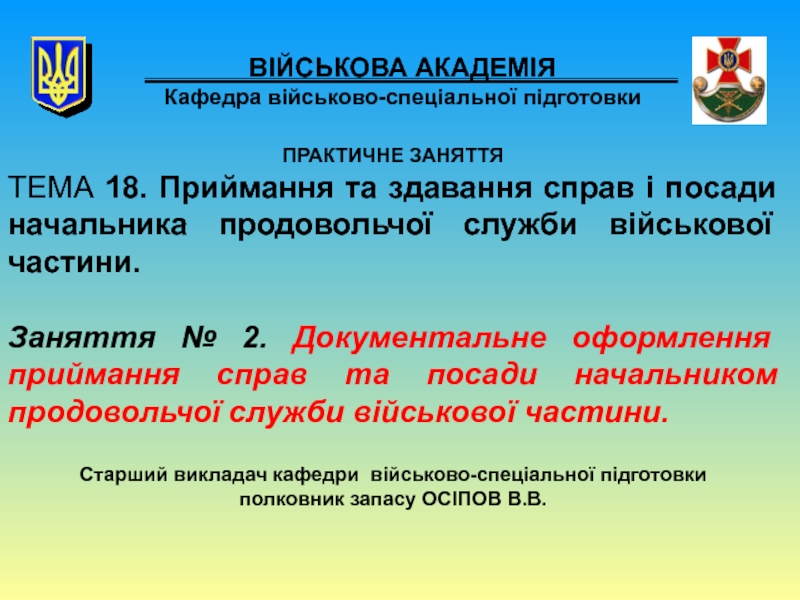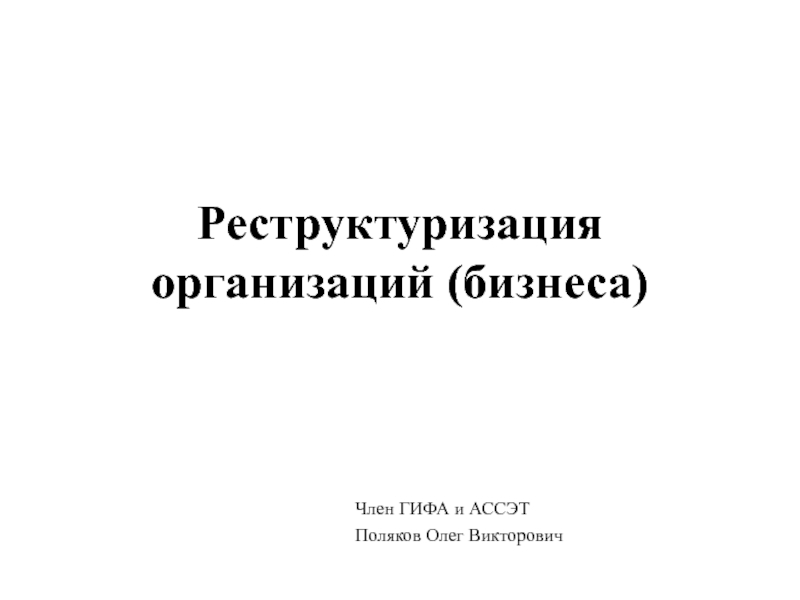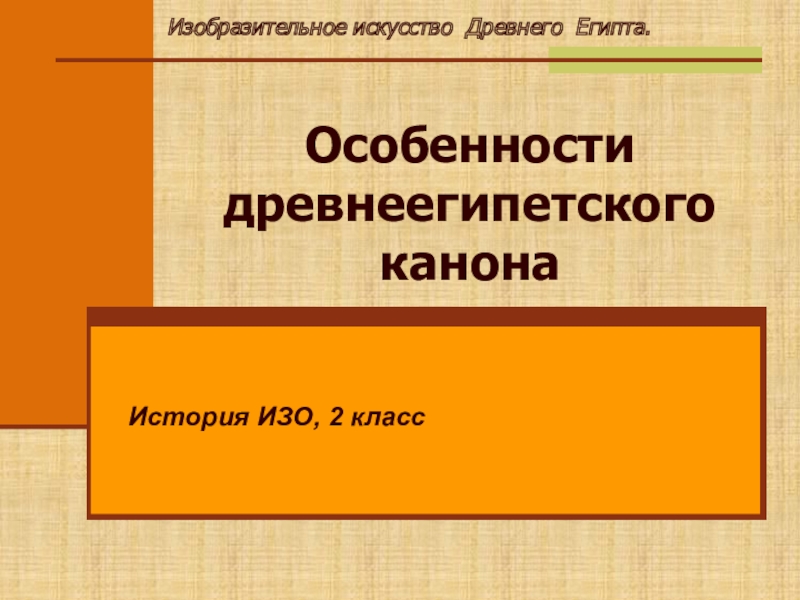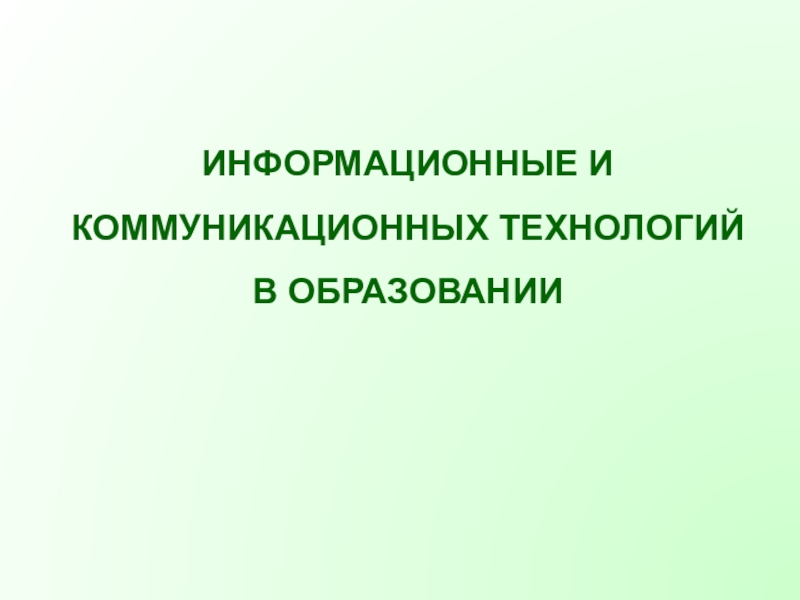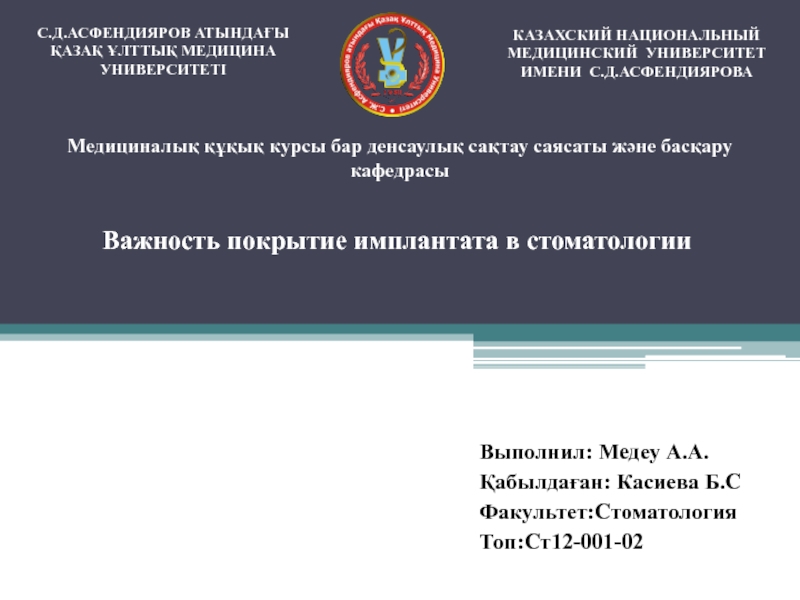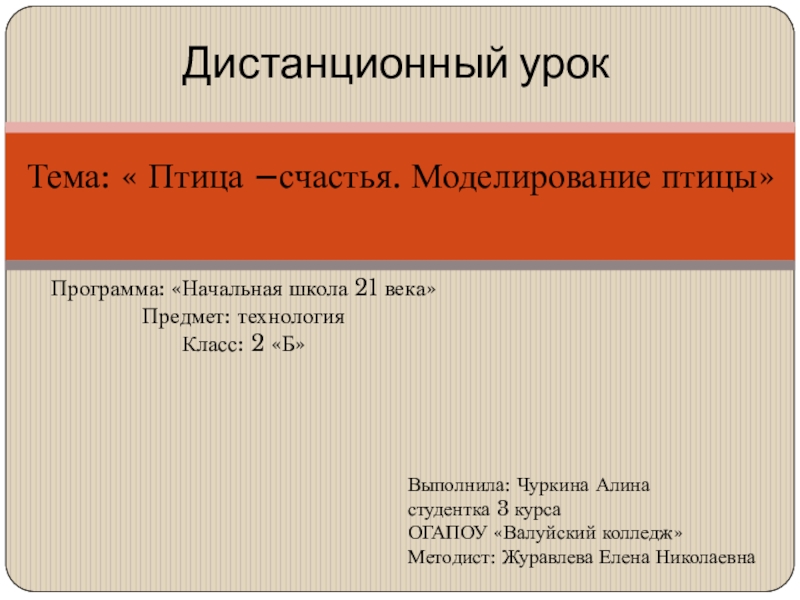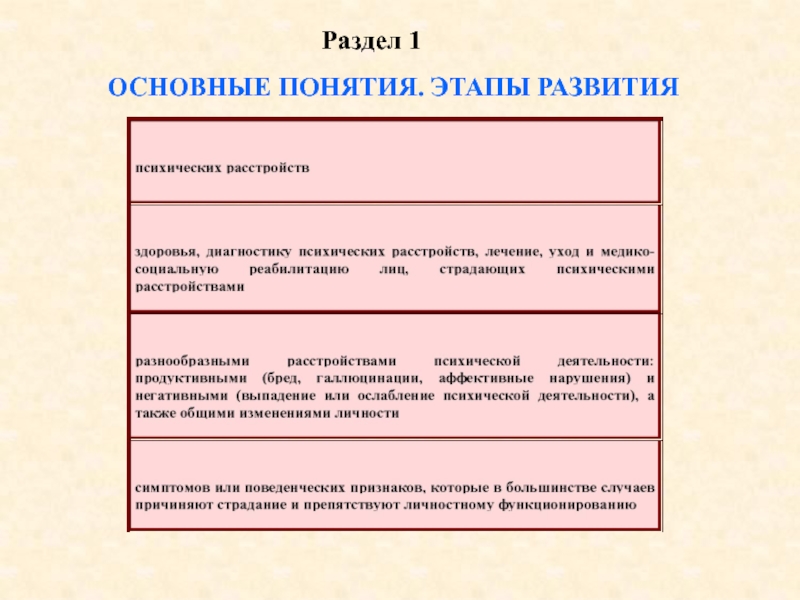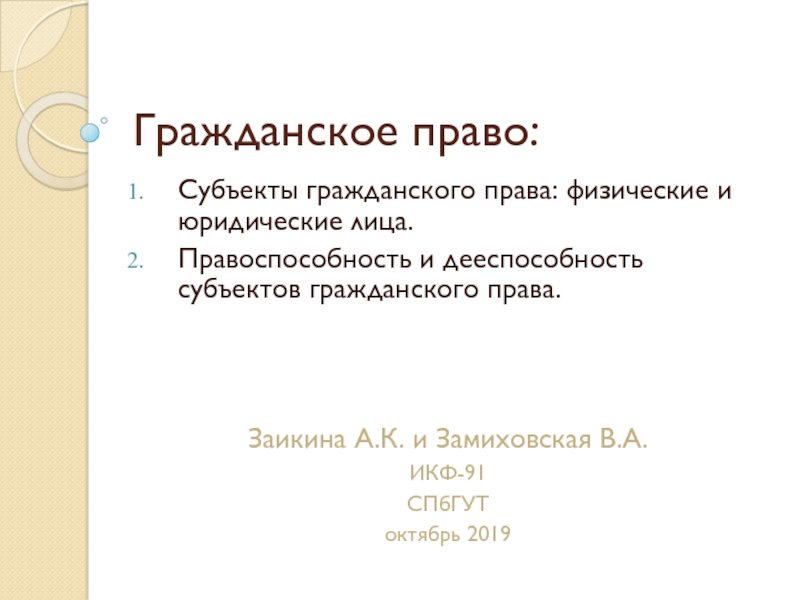Слайд 1Lecture 12
the Pronoun
1. The Problem of Singling out the Pronoun
as a Separate Part of Speech.
2. Subclasses of Pronouns:
a) Traditional Classification Based on Meaning;
b)Functional Classification.
3. Morphological Features of the Pronoun.
4. Syntactic Characteristics of the Pronoun.
5. Words of Broad Meaning and Their Pronominal Features.
Слайд 21. The Problem of Singling out the Pronoun as a
Separate Part of Speech
Categorial meaning: deixis.
The pronouns I, you, he,
etc., though pointing to things and in so far resembling nouns, cannot as a rule be modified by adjectives.
These pronouns differ from nouns in that they cannot be connected with any article, or modified by a prepositional phrase.
Слайд 3Morphological Composition
Simple pronouns (the stem): I, you; this, that; all,
one, etc.
Compound pronouns (more than one stem): myself, somebody, no
one, nothing, etc.
Composite pronouns (phrase): each other, one another.
Слайд 42. Subclasses of Pronouns:
a) Traditional Classification
1) personal,
2) possessive,
3) reflexive,
4) demonstrative,
5) interrogative,
6) connective,
7) reciprocal,
8) indefinite,
9) negative,
10) generalizing,
11) quantitative,
12) contrasting.
Слайд 5Personal Pronouns
Nucleus of the class
I (me), thou (thee), he (him),
she (her), it, we (us), you, they (them).
The personal pronouns
serve to indicate all persons and things from the point of view of the speaker
All the personal pronouns are said to be noun pronouns or pro-nouns
Слайд 6Possessive Pronouns
Possessive pronouns are usually treated as adjective pronouns, whereas
they are in reality noun pronouns or pro-nouns
Possessive pronouns are
possessive case opposites of the personal pronouns
Two sets of possessive pronouns — the conjoint possessive pronouns my, thy, her, our, your, their and the absolute possessive pronouns mine, thine, ours, yours, theirs.
The pairs my — mine, thy — thine, our — ours, your — yours, etc. can be regarded as opposemes of a grammatical category. It resembles the category of case.
Слайд 7Reflexive Pronouns
They are compound noun pronouns whose second 'element -self
expresses the anaphorical relation of the first element, i. e.
it shows that the first element refers to the person mentioned previously in the sentence.
I ... myself, thou .. thyself, he (or John) ... himself, she (or Mary) ... herself, it (or bird) . itself, we .. ourselves, you ... yourself (yourselves), they (or the chidren) ... themselves, one ... oneself.
The reflexive pronouns distinguish the lexico-grammatical meanings of person, number and gender.
Some linguists are of the opinion that in myself — ourselves, yourself— yourselves number is expressed grammatically.
These pronouns are used to form the so-called reflexive voice.
Слайд 8Demonstrative Pronouns
The pronouns this (these), that (those), such and (the)
same are regarded as demonstrative. But this small group is
not homogeneous.
The pronouns this — that (these — those) are correlative.
The pronouns such and (the) same have no correlative pronouns.
Слайд 9Interrogative Pronouns
The meaning that unites the interrogative pronouns:"an inquiry" about
some object (what, who), its properties (whose, which, what), place
of some event (where), its time (when), cause (why), manner of existence (how).
This group embraces pro-nouns (what, who, which, whose), pro-adjectives (what, which) and pro-adverbs (where, when, why, how).
Who and what are regularly used to distinguish "persons" and "non-persons".
The pronoun who is the only interrogative pronoun which has a case opposite, whom, as in Whom did you meet?
But! There is a distinct tendency to substitute the nominative case (who) for the objective (whom), which may eventually bring about the obliteration of case distinctions in the interrogative pronouns.
Слайд 10Connective Pronouns
The pronouns who, what, which, whose, that, where, when,
why, how are called 'connective' when they serve to connect
clauses in complex sentences.
At the same time they retain their meanings and functions of pro-nouns, pro-adjectives or pro-adverbs.
This combination of functions is a typical feature of the connective pronouns.
In accordance with their meaning and the types of clauses they introduce they fall into two groups: conjunctive pronouns and relative pronouns.
Слайд 11Reciprocal Pronouns
These are the group-pronouns — each other and one
another.
They serve to express mutuality.
It is traditionally maintained that
each other implies only two and one another more than two, but this rule is often ignored, one another and each other becoming interchangeable.
The reciprocal pronouns share the noun case system.
Common case Possessive case
each other — each other's
one another — one another's
Слайд 12Indefinite Pronouns
This class includes some, any, every, no (and their
compounds), all, each, either, much, many, few, little, etc., words
of different lexical and grammatical nature.
V. N. Zhigadlo, P. Ivanova and L. L. lofik suppose that only the pronouns some, any and their compounds really indicate things, properties, etc. in an indefinite way.
They can be used as pro-nouns (some, somebody), pro-adjectives (some, each), as pro-adverbs (some)
Слайд 13Negative Pronouns
The negative pronouns are no, nobody, nobody's, none, nothing,
neither, nowhere.
They can be used as pro-nouns (nobody, nobody's, none,
neither, nothing), pro-adjectives (no, neither), as a pro-adverb (nowhere) and a pro numeral (none).
E. g. How many have you caught? — Nine as yet.
The negative pronouns serve to build up negative sentences.
Слайд 14Like the other pronouns in -body, -one, and -thing the
negative pronouns distinguish 'person' and 'non-person'
Neither refers both to animate
and inanimate objects (two of them).
In neither case can I agree. Both smil°d but neither spoke (Heyer).
Nobody — nobody's is a case opposeme of the noun type.
Слайд 15Generalizing pronouns
Such pronouns as all, both, each, either, every and
its compounds (everyone, everybody, everything, everywhere) which give a generalizing
indication of persons, things, properties and circumstances.
This group includes pro-nouns (all, both, each, either, everybody, everyone, everything); pro-adjectives and pro-numerals (every, each, all, both, either); pro-adverb (everywhere) .
All, everybody, everything, everywhere, both may be said to have an inclusive, uniting meaning as opposed to every, each, either conveying a separating meaning '.
Слайд 16Quantitative Pronouns
Here belong much, many, (a) few, (a) little, several,
enough
They may function as pro-nouns (much, many, (a) few, several,
(a) little, enough); pro-adjectives (much, (a) little, enough); pro-numerals (many, several, (a) few); and pro-adverbs (much, (a) little, enough).
Most quantitative pronouns form opposemes of comparison:
many – more, the most
few – fewer, the fewest
little – less, the least
Слайд 17Contrasting Pronouns
Here belonged/- (others, other's, others'), another (another's) and otherwise.
They
are united by the meaning "not the (object, property, circumstance)
indicated" and contrast therefore with the demonstrative pronouns:
This, that (book) — another (book)
these, those (books) — other (books)
these, those — others
thus, so — otherwise.
Other, others, other's, another, another's are used as pronouns, other and another as pro-adjectives, and otherwise as a pro-adverb.
Слайд 18When the pro-noun other denotes inanimate things, it has only
a number opposite, others, like nouns of the book type.
When it denotes persons, it has also a case opposite, other's, like nouns of the boy type.
Another peculiarity of other is its combinability. Like a noun it may be used with the definite article or a demonstrative pronoun.
Слайд 19One
At least three-variants of this pronoun: 1) an indefinite pronoun,
2) an indefinite personal or generalizing personal pronoun, 3) a
prop-word.
As an indefinite pronoun it is usually a pro-adjective with the meaning "a certain" and refers to both living beings and inanimate things.
As an indefinite or generalizhig personal pronoun one indicates only a person. It is a pro-noun. It has a case opposite one's and is correlated with the reflexive pronoun oneself.
Sometimes one serves to disguise the speaker, as in О п e just can't throw о п e' s self-respect to the dogs because of this sandy-haired boy. (Williamson).
Слайд 20b) Functional Classification
All classes of pronouns are not united by
common morphological or syntactical characteristics.
They constitute a separate class of
words with peculiar meanings and references to the world of reality.
All of them are of double nature, as they combine their peculiar meanings with certain properties of definite parts of speech.
Слайд 223. Morphological Features
of the Pronoun
Case
B.A.Ilyish:
Nomin. I he
she (it) we (you) they who
Obj. me him her (it) us (you) them whom
Genitive somebody’s, anybody’s, one’s, another’s
Слайд 23M.Y.Blokh:
Personal pronominal system of cases has completely disintegrated, and in
its place the four individual word-types of pronouns have appeared:
the nominative form
the objective form
the possessive form (conjoint and absolute).
Слайд 24Number
this/ these
that / those
other / others (if not used
before a noun)
The pronouns I / we; he, she, it
/ they have no grammatical category of number.
Слайд 254. Syntactic Characteristics
of the Pronoun
Personal Pronouns
The nominative form:
subject of
the sentence
predicative in the compound nominal predicate in sentences like:
It was I who did it.
Both the nominative and the objective case forms are used after the conjunctions as and than in comparative constructions: She is taller than I / me.
Слайд 26The objective form:
object (with or without a preposition);
occasionally as
an attribute in prepositional phrases: Give me your hand; Were
you speaking about me?; The better half of me protested.
Слайд 27Possessive Pronouns
I raised my eyebrows.
He rose up and put his
hands in his small pockets.
Mine is a beautiful garden.
This book
is hers.
Слайд 28Reflexive Pronouns
Cedric himself knew nothing whatever about it. (apposition)
I
have all kinds of beautiful sentiments myself. (apposition)
I learned
to dress myself many years ago. (direct object)
Слайд 29“How well you talk,” said the Miller’s wife pouring herself
a large glass of warm ale. (indirect object)
She talks only
about herself. (prepositional object)
Слайд 30My wife and myself welcome you, sir. (subject)
In some minutes
she became herself again. (predicative)
She showed me a large picture
of herself as a bride. (attribute)
My brother was a Robbins like myself. (adverbial modifier of comparison)
He lived in a tiny cottage all by himself. (adverbial modifier of manner)
Слайд 31Reciprocal Pronouns
Reciprocal pronouns in their common form function as objects:
Now
they hate each other. They often quarrelled with one another.
The
possessive forms are used as attributes:
They stood silent, in each other’s arms.
Слайд 32Demonstrative Pronouns
Syntactically the pronouns this and that can be subject,
predicative, object, or attribute.
This was my old dear car again.
His
story was like that.
Do you remember this?
The woods are so beautiful at this time of year.
Слайд 33Indefinite Pronouns
Function as noun-pronouns
Something unexpected always happened to him.
Let somebody
bring me a glass of water.
Did somebody call me up?
One
is used as subject and attribute (in the genitive case)
One never knows what may happen.
One’s thoughts should be kept to oneself.
Слайд 34Negative Pronouns
I told him nothing.
None were present at the meeting.
I
remember none of the stories.
It looked like nobody’s home.
Слайд 35Contrasting Pronouns
One of the girls was pretty, while the other
was terribly plain.
He gulped one cup, then another.
I live on
the other side.
Слайд 36Universal Pronouns
Function as noun-pronouns
All were present.
All night long she sat
by the window.
Everything looks so beautiful in spring.
I haven’t read
all the book.
Слайд 37Interrogative Pronouns
Function as noun-pronouns and adjective-pronouns
What has happened?
What is his
name?
What did you say?
What are you looking at?
What book are
you reading?
Слайд 38Conjunctive Pronouns
Who did it will repent. (who opens the subject
clause)
I know who did it. (who opens the object
clause)
They were what you call model girls. (what opens the predicative clause)
Whatever you may do you can’t save the situation. (whatever opens the adverbial concessive clause)
Слайд 39Relative Pronouns
Who he was is still a mystery (conjunctive pronoun).
I
don’t know which of the books is better (conjunctive pronoun).
That
is the man who has saved your child (relative pronoun).
Here is the book which the lecturer recommended (relative pronoun).
Relative pronouns may function in the subordinate attributive clause as subject, object, attribute, and adverbial modifier (with prepositions).
Слайд 405. Words of Broad Meaning and Their Pronominal Features.
Notional words
of broad meaning are identified as forming an intermediary layer
between the pronouns and notional words proper.
I wish at her age she'd learn to sit quiet and not do things.
Flora's suggestion is making sense.
I will therefore briefly set down the circumstances which led to my being connected with the affair.
Слайд 41The lexical paradigm of nomination receives a complete substitutive representation.
one, it, they...-do, make, act...-such, similar, same... - thus, so,
there...
Symbolically the correlation of the nominal and pronominal paradigmatic schemes is stated as follows:
N-V-A-D- Npro - Vpro - Apro - Dpro
